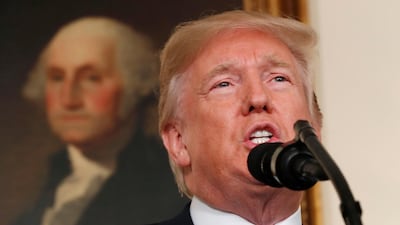Containment of Iran will emerge alongside countering non-state actors and closer alignment with allies at the heart of America's Middle East security policy when a review of the administration's strategy is published in Washington on Monday.
The more structured approach to US national security strategy marks the culmination of a tumultuous first year in power for the Republican team.
The strategy, which details the US government’s approach and goals in policy making at home and abroad, has emerged relatively early in Donald Trump’s administration. Predecessors Barack Obama and George W Bush waited for 17 months and 21 months before putting out such a document, while the Trump team approved the blueprint less than 11 months after taking office.
Although the document will officially be made public on Monday, US senior officials — including national security adviser HR McMaster — confirming a trajectory of escalation against Iran, which the Trump administration defines as a “rogue regime” alongside North Korea.
However, based on excerpts from a draft of the doctrine, which ran in The Atlantic last week, the document does not fall in line with some of Mr Trump's campaign promises and rhetoric. The excerpts embraced a more globalist approach to international challenges and shied away from isolationist policies, such as building a wall and ending trade deals — campaign promises that helped Mr Trump get elected.
The administration has stated "America First" does not mean "America Alone". It will make clear that the United States will stand up for itself even if that means acting unilaterally or alienating others on issues like trade, climate change and immigration, according to sources familiar with the strategy.
"Strengthening control over our borders and immigration system is central to national security, economic prosperity, and the rule of law," the draft adds. "Terrorists, drug traffickers, and criminal cartels exploit porous borders and threaten US security and public safety. These actors adapt quickly to outpace our defenses. The United States affirms its sovereign right to determine who should enter our country and under what circumstances."
Both deputy national security adviser Dina Powell and Dr Nadia Schadlow, who worked on strategy under Mr McMaster, oversaw the drafting of the 70-page doctrine. It was discussed by dozens of members of Congress, agreed on by key members of the cabinet, and approved by Mr Trump himself, according to Axios news website.
Mr McMaster has said that the new strategy was framed around “principled realism”. He added that the policy will be guided by four priorities: defending the homeland, protecting American prosperity, sustaining peace through strength, and advancing American influence.
He also said that the new policy will outline threats from the “revisionist powers”, Russia and China, and from “rogue regimes”, such as Iran and North Korea.
On Iran, Mr McMaster has said that it was a leading state sponsor of terrorism, reiterating the US government is committed to cut its path to nuclear weapons and efforts to destabilise the Middle East.
The new national security strategy comes after strong rhetoric by Mr McMaster and US ambassador to the UN Nikki Haley, who on Thursday presented "concrete evidence" of Iran's weapons proliferation. It also highlights a shift in policy and approach from that of the Obama administration.
Read more: Security strategy should provide clarity, but Trump foreign policy doctrine laced with contradiction
The doctrine is also expected to slam Moscow and its threat to the US despite Mr Trump’s soft rhetoric towards Russia during the presidential campaign.
“We’re facing a threat from Russia that involves so-called new generation warfare,” Mr McMaster said on Tuesday at a forum on US relations with Britain run by the Policy Exchange think tank.
“And these are very sophisticated campaigns of subversion — and disinformation, and propaganda, using cybertools operating across multiple domains — that attempt to divide our communities within our nations and pit them against each other and try to create crises of confidence.
"We have to work together harder than ever to ensure that nations uphold the rule of law, respect the sovereignty of their neighbours and support the post-World War Two, post-Cold War order of peace, stability and collective security.
Meanwhile the new strategy will advocate more co-operation and engagement with US allies in the Middle East, Asia and Europe.
“Geopolitics are back, and back with a vengeance, after this holiday from history we took in the so-called post-Cold War period,” Mr McMaster said.
He summed up the new national security strategy with key phrases, including “competitive engagement”, “strengthen alliances through, in part, reciprocity”, and “ensure the US is confident”.
Read more: Is there a way North Korea and the US can be walked back from war?
The doctrine is expected to honour freedom of expression and individual freedoms, but it remains unclear whether it will adopt calls to spread democracy and respect human rights — issues that have been shelved by the Trump administration.
While the national security strategy represents a guiding compass for any US administration, many of its guidelines have in the past been disregarded due to developments on the ground.
During Mr Obama’s second term, the US National Security Strategy sought to work with "partners to train and equip a moderate Syrian opposition to provide a counterweight to the terrorists and the brutality of the Assad regime”. The strategy also aimed to end the Israeli-Palestinian conflict "through a two-state solution that ensures Israel’s security and Palestine’s viability” — goals that were not achieved by the time Mr Obama left office.

